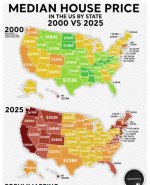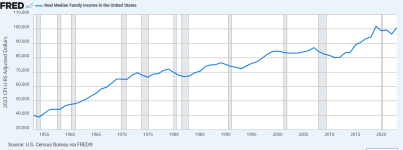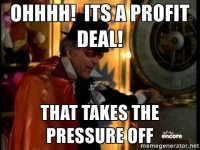OT: 2000 v 2025 median home prices by state
- Thread starter horshack.sixpack
- Start date
You are using an out of date browser. It may not display this or other websites correctly.
You should upgrade or use an alternative browser.
You should upgrade or use an alternative browser.
The house is worth more because you can't build em like you used to.*** Literally.View attachment 857365
ETA: Inflation rose 4.7%, 8% and 4.1% from 2021-2023. If you're looking for exactly when it got very bad.
Approximately 40% of the increase in the cost of housing over the last 25 years has nothing to do with inflation. It's regulation of new construction. The sheer number and expense of of permits required in most jurisdictions is mind boggling. I'm not sure there will be anywhere left in the country you can frame with 2*4 by 2030, it will all be 2*6.
Interesting View attachment 857353
For Mississippi, that reflects a 2.5% annual increase in real terms for those 25 years. I'm assuming that is held down by sales in the many parts of the houses losing population and that the median house prices in South Memphis, Tupelo, Jackson suburbs, Hattiesburg MSA, and the Coast have all gone up considerably more than that.
Texas was an average of 3.23%.
Florida 3.04%.
California 3.05%
I originally typed out these numbers thinking it wasn't out of line with inflation because I missed that both maps were in 2025 dollars. Pretty brutal.
The actual effect is 10% per year increases nationwide from Q4 2019 to Q4 2022, following a period of basically 0% growth from 2000-2019 when adjusting for inflation. The chart above is already adjusted for inflation. So it is significant that you see a net 2.5%-3% increase average per year over 25 years - even with 0% growth over around 80% of that period. Shows you how big that 2019-2022 increase was, and how tight those golden handcuffs are on anyone who was a homeowner before or during 2019.View attachment 857365
ETA: Inflation rose 4.7%, 8% and 4.1% from 2021-2023. If you're looking for exactly when it got very bad.
Last edited:
I've lived in a 1960 ranch framed with 2x4 that seemed sturdy enough so definitely don't think 2x6 should be required.The house is worth more because you can't build em like you used to.*** Literally.
Approximately 40% of the increase in the cost of housing over the last 25 years has nothing to do with inflation. It's regulation of new construction. The sheer number and expense of of permits required in most jurisdictions is mind boggling. I'm not sure there will be anywhere left in the country you can frame with 2*4 by 2030, it will all be 2*6.
That said, I built with 2x6's because I wanted the extra strength and extra insulation. Not sure how much extra it cost me or whether I'll ever recoup it in energy savings or decreased insurance costs. Maybe not very smart but didn't even consider 2x4 framing.
The price and supply of building materials isn’t exactly helping, either.The house is worth more because you can't build em like you used to.*** Literally.
Approximately 40% of the increase in the cost of housing over the last 25 years has nothing to do with inflation. It's regulation of new construction. The sheer number and expense of of permits required in most jurisdictions is mind boggling. I'm not sure there will be anywhere left in the country you can frame with 2*4 by 2030, it will all be 2*6.
What’s a brand new house going for per square foot in the Golden Triangle? $200/sqft? More? Less?
And people wonder why insurance cost so much more. The cost of replacement has grown exponentially.
The delta in MS / TX for that period is one thing that stood out to me.For Mississippi, that reflects a 2.5% annual increase in real terms for those 25 years. I'm assuming that is held down by sales in the many parts of the houses losing population and that the median house prices in South Memphis, Tupelo, Jackson suburbs, Hattiesburg MSA, and the Coast have all gone up considerably more than that.
Texas was an average of 3.23%.
Florida 3.04%.
California 3.05%
I originally typed out these numbers thinking it wasn't out of line with inflation because I missed that both maps were in 2025 dollars. Pretty brutal.
I actually had to call my insurer and tell them to raise my coverage, and of course my premium with it…And people wonder why insurance cost so much more. The cost of replacement has grown exponentially.
ETA: my lot alone is probably now worth close to what my house cost when I built
Without 2x6 with spray foam insulation, how will you keep the oceans from rising while cooling your 5,000sqft house for yourself and your spouse?The house is worth more because you can't build em like you used to.*** Literally.
Approximately 40% of the increase in the cost of housing over the last 25 years has nothing to do with inflation. It's regulation of new construction. The sheer number and expense of of permits required in most jurisdictions is mind boggling. I'm not sure there will be anywhere left in the country you can frame with 2*4 by 2030, it will all be 2*6.
Holy 17 that can’t be right can it?I originally typed out these numbers thinking it wasn't out of line with inflation because I missed that both maps were in 2025 dollars. Pretty brutal.
I know you're joking, but the 2x6 only matters if you are doing batt or cellulose. Unless it's a do it yourselfer not worried about material cost, don't think anybody is spraying walls more than the depth of a 2x4.Without 2x6 with spray foam insulation, how will you keep the oceans from rising while cooling your 5,000sqft house for yourself and your spouse?
Well, I know my rates went up like 50% on home policy between 2020 and 2025 without my replacement cost limit changing by very much. Also went up 20-30% on auto with the same cars, same drivers, no accidents, and no tickets. So, I don’t really think the replacement cost increase is a huge factor, or else I would have gotten a lot more for my money.And people wonder why insurance cost so much more. The cost of replacement has grown exponentially
The fact is that insurance is a giant shell game. We’re told that we’re paying our premiums based on the appraisal and associated risks on our covered items. But the reality is that we’re paying for everyone else’s risk, too. Just like health care. Companies will absolutely make up for losses in one segment (like auto), with gains from another….and rob Peter to pay Paul for no reason other than the bottom line.
And that might be a very good thing to do.The house is worth more because you can't build em like you used to.*** Literally.
Approximately 40% of the increase in the cost of housing over the last 25 years has nothing to do with inflation. It's regulation of new construction. The sheer number and expense of of permits required in most jurisdictions is mind boggling. I'm not sure there will be anywhere left in the country you can frame with 2*4 by 2030, it will all be 2*6.
Speaking of spray foam insulation, please don't do it anyone. It retains moisture and is an easy path to a termite infestation. They love the stuff. Termite control contractors are no longer insuring homes with the spray foam insulation in most places. They are dropping folks and refusing coverage on new construction.Without 2x6 with spray foam insulation, how will you keep the oceans from rising while cooling your 5,000sqft house for yourself and your spouse?
The crazy home price increase started about 2006, right before the first housing "bubble" burst. It's jumped more since 2006 than it did for as far back as anybody here can remember.
Indian princess Warren has a bill proposed that's pretty interesting and seems to be gaining support. She'll get it fixed.*
Indian princess Warren has a bill proposed that's pretty interesting and seems to be gaining support. She'll get it fixed.*
That's only a small portion of it. They're also using the climate change excuse and they're ripping us all off anyway. They're now flying drones around your home and telling you to fix things if you want to keep coverage. It's a racket!And people wonder why insurance cost so much more. The cost of replacement has grown exponentially.
I was on a board of directors for an insurance company during that time. Cost of replacement was a huge factor. More than you’re giving it.Well, I know my rates went up like 50% on home policy between 2020 and 2025 without my replacement cost limit changing by very much. Also went up 20-30% on auto with the same cars, same drivers, no accidents, and no tickets. So, I don’t really think the replacement cost increase is a huge factor, or else I would have gotten a lot more for my money.
The fact is that insurance is a giant shell game. We’re told that we’re paying our premiums based on the appraisal and associated risks on our covered items. But the reality is that we’re paying for everyone else’s risk, too. Just like health care. Companies will absolutely make up for losses in one segment (like auto), with gains from another….and rob Peter to pay Paul for no reason other than the bottom line.
No worry guys, the free market will sort this out.**That's only a small portion of it. They're also using the climate change excuse and they're ripping us all off anyway. They're now flying drones around your home and telling you to fix things if you want to keep coverage. It's a racket!
In 1960, a 2x4 was actually 2x4. Now it’s 1.5x 3.5. And made with cheaper wood.I've lived in a 1960 ranch framed with 2x4 that seemed sturdy enough so definitely don't think 2x6 should be required.
That said, I built with 2x6's because I wanted the extra strength and extra insulation. Not sure how much extra it cost me or whether I'll ever recoup it in energy savings or decreased insurance costs. Maybe not very smart but didn't even consider 2x4 framing.
The free market has been manipulated so long, nothing is freeNo worry guys, the free market will sort this out.**
FACT! Old wood is bigger than new wood!In 1960, a 2x4 was actually 2x4. Now it’s 1.5x 3.5. And made with cheaper wood.
Noshit.The free market has been manipulated so long, nothing is free
The modern US economy has always been a mixed economy.
Since you didn't pick up on the point I was jokingly making, I will spell it out.
The free market wouldn't fix this.
#THANKSBIDENView attachment 857365
ETA: Inflation rose 4.7%, 8% and 4.1% from 2021-2023. If you're looking for exactly when it got very bad.
And you missed I was agreeing with you and you chose to be a dick headNoshit.
The modern US economy has always been a mixed economy.
Since you didn't pick up on the point I was jokingly making, I will spell it out.
The free market wouldn't fix this.
I mean, it’s however big of a factor that they decided to make it in their algorithm that your particular company used. I can’t say what that is. But its not likely to be the same weight everywhere, with every company.I was on a board of directors for an insurance company during that time. Cost of replacement was a huge factor. More than you’re giving it.
All I was saying is that they jacked up my premiums without changing the cap on my replacement cost, which is also clearly listed in the policy. So, if I’m not getting more coverage, and my risk factors for claims aren’t changing (I’d had zero home or auto claims for a decade, zero tickets or accidents, and I don’t live in a natural disaster hotbed), and I’m not changing deductibles, then WTF was I paying the increased premium for?
In my insurer’s case, I believe the answer is that everyone’s real world ACV replacement costs were increasing, but they kept the caps lower than actual in a lot of the policies for a few years, in spite of increasing home values. In other words, they took on a little bit of PR risk in order to offer cheaper premiums and stay competitive. But then 2020-2022 hit, and forced them to change course because they were staring down the barrel of a crisis if they were forced to pay out 20-30% less than actual value on thousands of homes if there was some localized catastrophe.
But, they couldn’t just raise it up on those specific policies only, because they’d be dealing with a shít ton of defections at the next renewal. So, they spread the increase out to everyone, even those folks with properly assessed replacement costs already in the policy. It’s not a perfectly efficient marketplace.
I have insurance with same company. I have a HO5. My house is worth about 265K, but my policy has grown to 345K. If my house is completely destroyed by covered peril, they will pay me the 345K plus depreciated value of furniture and other item inside the house. I asked why and my agent said that as the explanation.I was on a board of directors for an insurance company during that time. Cost of replacement was a huge factor. More than you’re giving it.
I saw that too, but does it seem realistic? $1 in 2000 is $1.87 today, so if my math is right, doesn’t that mean that the median 2000 MS home price was around $73k in 2000 dollars? I don’t think you could’ve bought an Academy Village condo for thatI originally typed out these numbers thinking it wasn't out of line with inflation because I missed that both maps were in 2025 dollars. Pretty brutal.
That's a good point. Party of the problem may be that it's not median home "value" but median home price, which I suspect is going to be calculated based on the median of sales. BUt you'd think over a large enough area that median price of sales is probably usually a decent approximation of the value of the median house, but I'm not sure that's always the case. Low value rental stock seems to change hands a lot more than primary homes, so maybe that makes the median sale less representative of the median home when there is a lot of investment activity?I saw that too, but does it seem realistic? $1 in 2000 is $1.87 today, so if my math is right, doesn’t that mean that the median 2000 MS home price was around $73k in 2000 dollars? I don’t think you could’ve bought an Academy Village condo for that
But yea, I definitely would have thought the median in 2000 dollars would have been closer to $135k in 2000 dollars than $73k. Would have to be a lot of sales in reallly undesirable parts of the state to have it that low. Pretty sure 2Br2Ba's in Academy village were close to a $100k in 2000. Knew somebody that bought in Glenn Hollow at the time for like $83k and that was considered a better location, but not sure what kind of shape it was in because those had been around a minute at that point.
I mean how else are the insurance companies gonna stay in business if they don't find a way to make a profit?Well, I know my rates went up like 50% on home policy between 2020 and 2025 without my replacement cost limit changing by very much. Also went up 20-30% on auto with the same cars, same drivers, no accidents, and no tickets. So, I don’t really think the replacement cost increase is a huge factor, or else I would have gotten a lot more for my money.
The fact is that insurance is a giant shell game. We’re told that we’re paying our premiums based on the appraisal and associated risks on our covered items. But the reality is that we’re paying for everyone else’s risk, too. Just like health care. Companies will absolutely make up for losses in one segment (like auto), with gains from another….and rob Peter to pay Paul for no reason other than the bottom line.
Not sure I follow what you are asking. My post wasn’t about whether they need to find a way to make a profit, it’s more about HOW they do that.I mean how else are the insurance companies gonna stay in business if they don't find a way to make a profit?
In this case, they need to do a better job of matching premiums to the actual risk of their customers, so they aren’t having come in on the back end and subsidize their losses with premium increases on low risk customers / assets. At more of a micro level, they also need to make better investments with their cash reserves so that they can offer lower / more competitive premiums to everyone.
So you are saying they should really stick it to say the people in california where fires happen and where say hurricanes happen and then not affect the places in say rural mississippi that don't have much risk?Not sure I follow what you are asking. My post wasn’t about whether they need to find a way to make a profit, it’s more about HOW they do that.
In this case, they need to do a better job of matching premiums to the actual risk of their customers, so they aren’t having come in on the back end and subsidize their losses with premium increases on low risk customers / assets. At more of a micro level, they also need to make better investments with their cash reserves so that they can offer lower / more competitive premiums to everyone.
I mean i get it, but if they do that here's whats likely going to happen. The people in high risk places won't buy it b/c it will be way too high. This in turn will mean less sales which will likely raise the price of say rural mississippi anyway.
There is an alternative though. Someone who thinks what you are saying is true could go and start an insurance business. Your niche could be really cheap premiums for low risk places.
I'M ACTUALLY BEING SOMEWHAT SERIOUS.
I have 2 houses insured right now plus i have builders risk on 2 places and an HOA policy for several units.
Every single one of them is insured for more than what i can sell them for. Buttt buttt replacement cost!! Let my $240,000 house burn to the ground and give me $340,000 in insurance!! I aint gonna replace it. I'm gonna go buy something for $150,000 and put $60,0000 in it and try to sell it for $260,000 plus and invest the additional $130,000 from insurance into the market. Then i'll sell the lot where my house burnt down.
I dunno man. I bought and sold a house after owning it for about 1 year in the 16-17 range for 25% more than I bought it. Markets have been psycho since before post covid inflation (which didn't help).View attachment 857365
ETA: Inflation rose 4.7%, 8% and 4.1% from 2021-2023. If you're looking for exactly when it got very bad.
Well they are already sticking it to people in CA and are pulling out of those high risk areas entirely. But they are also raising the premiums in MS, too. They are preventing future losses by not insuring those high cost / high risk properties, but also trying to cover past losses by getting the low risk clientele to pay for it. They’re trying to have their cake and eat it too.So you are saying they should really stick it to say the people in california where fires happen and where say hurricanes happen and then not affect the places in say rural mississippi that don't have much risk?
End of the day, stuff like the Palisades wildfires were devestating, but nowhere close to the scale of what could have happened. In no way was that a Hurricane Katrina situation or anything like that. Wildfires happen every year in that area. If it was that easy for them to take massive losses from one that got a little closer to population centers, then the premiums on those homes should have been way higher a long time ago.
Or because it’s no longer offered, which is the case for many of the big national insurance companies out there.I mean i get it, but if they do that here's whats likely going to happen. The people in high risk places won't buy it b/c it will be way too high.
This in turn will mean less sales which will likely raise the price of say rural mississippi anyway.
Why? They can’t simply cut labor, overhead, and field agents in the areas they are no longer servicing? More sales isn’t the only way to increase profitability.
Every single one of them is insured for more than what i can sell them for. Buttt buttt replacement cost!! Let my $240,000 house burn to the ground and give me $340,000 in insurance!! I aint gonna replace it. I'm gonna go buy something for $150,000 and put $60,0000 in it and try to sell it for $260,000 plus and invest the additional $130,000 from insurance into the market. Then i'll sell the lot where my house burnt down.
You may want to research that a bit further.
Last edited:
Which part? Mississippi pays you what they insure you. You don't have to rebuild.You may want to research that a bit further.
And again? i'm not sure what your point is on insurance. They make a very thin profit margin. What do you want them to do?
Median home price in MS in 2000 was ~$71,400 (national median was $119,600)That's a good point. Party of the problem may be that it's not median home "value" but median home price, which I suspect is going to be calculated based on the median of sales. BUt you'd think over a large enough area that median price of sales is probably usually a decent approximation of the value of the median house, but I'm not sure that's always the case. Low value rental stock seems to change hands a lot more than primary homes, so maybe that makes the median sale less representative of the median home when there is a lot of investment activity?
But yea, I definitely would have thought the median in 2000 dollars would have been closer to $135k in 2000 dollars than $73k. Would have to be a lot of sales in reallly undesirable parts of the state to have it that low. Pretty sure 2Br2Ba's in Academy village were close to a $100k in 2000. Knew somebody that bought in Glenn Hollow at the time for like $83k and that was considered a better location, but not sure what kind of shape it was in because those had been around a minute at that point.




